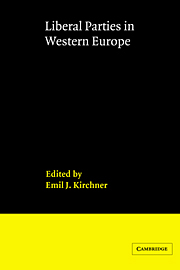Book contents
- Frontmatter
- Contents
- List of tables
- List of diagrams
- List of maps
- Notes on the contributors
- Preface
- 1 Introduction
- 2 Between left and right: the ambivalence of European liberalism
- 3 Two roads of Italian liberalism: the Partito Repubblicano Italiano (PRI) and the Partito Liberale Italiano (PLI)
- 4 The FDP in the Federal Republic of Germany: the requirements of survival and success
- 5 Great Britain — social liberalism reborn?
- 6 Liberalism in France
- 7 Liberal parties in the Netherlands
- 8 The Belgian liberal parties: economic radicals and social conservatives
- 9 The Freiheitliche Partei Österreichs: protest party or governing party?
- 10 The Swedish Liberal Party: The politics of unholy alliances
- 11 Liberalism in Denmark: agrarian, radical and still influential
- 12 The Norwegian Liberal Party: from political pioneer to political footnote
- 13 Liberal parties in Finland: from perennial coalition actors to an extra-parliamentary role
- 14 Liberal parties in Switzerland
- 15 The Luxemburg Liberal Party
- 16 Identifying liberal parties
- 17 Ambivalence revisited: an analysis of liberal party manifestos since 1945
- 18 Transnational links: the ELD and Liberal Party Group in the European Parliament
- 19 Western European liberal parties: developments since 1945 and prospects for the future
- Index of political parties
- General index
15 - The Luxemburg Liberal Party
Published online by Cambridge University Press: 16 November 2009
- Frontmatter
- Contents
- List of tables
- List of diagrams
- List of maps
- Notes on the contributors
- Preface
- 1 Introduction
- 2 Between left and right: the ambivalence of European liberalism
- 3 Two roads of Italian liberalism: the Partito Repubblicano Italiano (PRI) and the Partito Liberale Italiano (PLI)
- 4 The FDP in the Federal Republic of Germany: the requirements of survival and success
- 5 Great Britain — social liberalism reborn?
- 6 Liberalism in France
- 7 Liberal parties in the Netherlands
- 8 The Belgian liberal parties: economic radicals and social conservatives
- 9 The Freiheitliche Partei Österreichs: protest party or governing party?
- 10 The Swedish Liberal Party: The politics of unholy alliances
- 11 Liberalism in Denmark: agrarian, radical and still influential
- 12 The Norwegian Liberal Party: from political pioneer to political footnote
- 13 Liberal parties in Finland: from perennial coalition actors to an extra-parliamentary role
- 14 Liberal parties in Switzerland
- 15 The Luxemburg Liberal Party
- 16 Identifying liberal parties
- 17 Ambivalence revisited: an analysis of liberal party manifestos since 1945
- 18 Transnational links: the ELD and Liberal Party Group in the European Parliament
- 19 Western European liberal parties: developments since 1945 and prospects for the future
- Index of political parties
- General index
Summary
introduction
In the same way as in neighbouring West Germany and Belgium, and for similar reasons, the identification of a liberal party in Luxemburg presents no difficulty, the Demokratesch Partei qualifying by virtually any criterion. Of all the parties considered in this volume, the DP is by far the smallest in absolute terms but this has not prevented it from becoming one of the more important. In recent years especially, both domestically and internationally, it has become one of the most highly-influential liberal parties in Europe. For this reason alone, no study of present-day liberalism in Western Europe could be complete without reference to the Luxemburg Demokratesch Partei.
This influential position is due to a number of factors, of which the most important are probably the DP's almost uniquely high (for a European liberal party) vote percentage; its regular participation in government (and hence from time to time the presidency of the EC council of ministers); its rather strategic position virtually in the ideological centre of European liberalism; and, not the least important, the personality of several of its leaders since the Second World War, most notably Gaston Thorn.
Yet, as an organised party political force, liberalism was a distinctly late developer in the Grand Duchy, the country's first proper liberal party not emerging until as late as 1925 or so, even though both as a philosophy and as a political tradition, liberalism has had a long history in Luxemburg.
- Type
- Chapter
- Information
- Liberal Parties in Western Europe , pp. 376 - 395Publisher: Cambridge University PressPrint publication year: 1988
- 1
- Cited by



